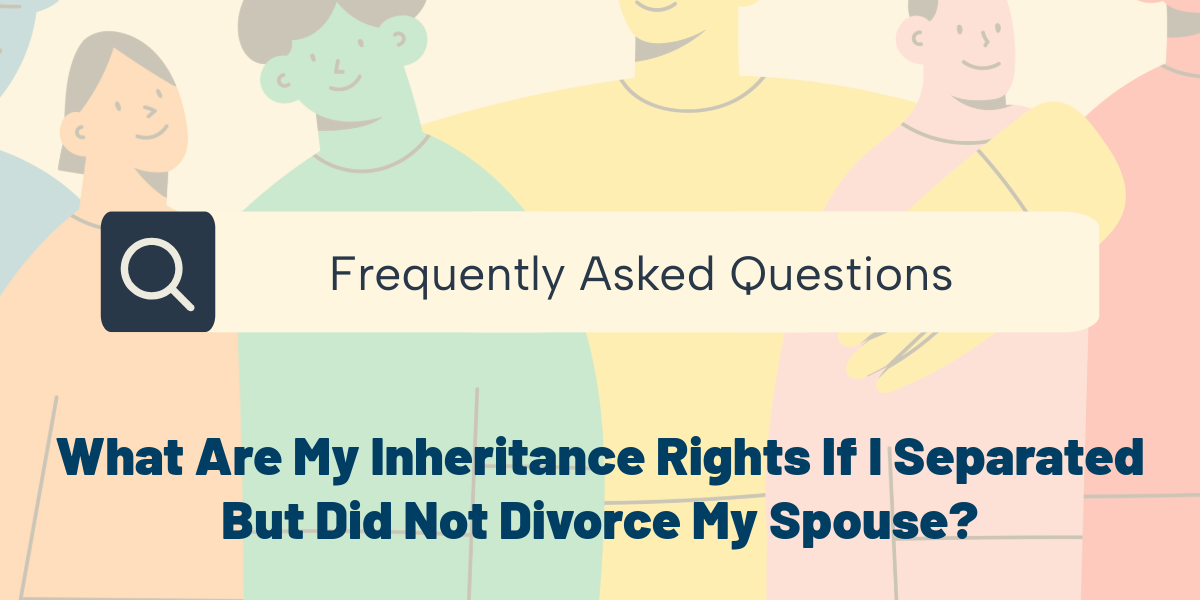Frequently Asked Questions About Probate and Life Insurance in North Carolina
What Are My Inheritance Rights If I Separated But Did Not Divorce My Spouse?
While a separation might feel like the end of a marriage, the law doesn’t see it that way until there’s a final divorce decree. This means a separated spouse in North Carolina may maintain certain rights, even if the couple is no longer living together. These rights can have a big impact on the distribution of assets and how a deceased spouse’s estate is handled. Understanding these rights is crucial for both spouses during the separation period.
The Elective Share: Protecting Your Inheritance Rights
One of the most important rights a separated spouse has is the right to an elective share. This right allows a surviving spouse to claim a portion of their deceased spouse’s estate, even if they were left out of the will or received less than they feel they are entitled to. This right applies even if the couple was separated at the time of the deceased spouse’s death.
The elective share is calculated based on the length of the marriage. For example, if the marriage lasted less than five years, the surviving spouse is entitled to one-sixth of the deceased spouse’s total net assets. If the marriage lasted more than fifteen years, the surviving spouse is entitled to one-half of the deceased spouse’s total net assets.
Understanding Total Net Assets
It’s important to note that “total net assets” doesn’t just include assets that go through probate. North Carolina’s elective share statute specifically includes assets held in revocable trusts, payable-on-death accounts, and other non-probate transfers. This helps to prevent a deceased spouse from disinheriting a separated spouse by simply transferring assets outside of the will.
Contesting the Will: The Right to File a Caveat
If a separated spouse believes the will is invalid or was executed under duress, undue influence, or without proper capacity, they have the right to contest the will by filing a caveat. A caveat is a legal challenge to the will that can delay or even prevent its probate. Successfully challenging a will can significantly impact the distribution of the estate, especially if there is suspicion of wrongdoing or if the separated spouse was unfairly disinherited.
Acts Barring Property Rights
There are certain acts that can cause a spouse to lose their inheritance rights. These acts are outlined in Chapter 31A of the North Carolina General Statutes. They include:
- Divorce or annulment
- Divorce from bed and board
- Living in adultery after a voluntary separation
- Willful abandonment of the deceased spouse
- Bigamy
It’s important to understand that simply being separated does not mean these acts have occurred. If a separated spouse is accused of one of these acts, they have the right to defend themselves and prove that the accusations are false.
Waiver of Rights
A separated spouse can waive some of their inheritance rights through various legal agreements. This includes:
- Prenuptial or postnuptial agreements
- Separation agreements
It’s essential to carefully review any agreement entered into during the separation period to understand the full impact on potential inheritance rights.
Seeking Legal Guidance
Navigating the legal complexities of separation and inheritance rights can be challenging. If you are separated and have questions about your rights, it’s crucial to seek guidance from an experienced probate administration attorney. An attorney can help you understand your rights, protect your interests, and guide you through the legal processes involved.
For specific legal guidance, contact our office at (919) 341-7055. We can provide direction based on your unique circumstances.
What is a spousal allowance, and how can it benefit me?
A spousal allowance, also known as the “year’s allowance,” is a provision under North Carolina law allowing a surviving spouse to claim a certain amount from the deceased spouse’s estate within one year of their passing. This allowance prioritizes the surviving spouse’s financial needs ahead of other creditors and beneficiaries.
According to North Carolina General Statutes § 30-15, the spouse is entitled to a year’s allowance equal to a specific amount, subject to certain conditions:
- The allowance should not exceed the sum available after paying funeral expenses, administration costs, and secured debts.
- The application for the year’s allowance must be filed with the Clerk of Superior Court in the county where the estate is being administered.
To ensure you benefit from this provision, or if you need assistance filing an allowance claim, contact our experienced probate attorneys at (919) 341-7055 for personalized support.
Can I access my deceased spouse’s personal property before probate is complete?
- Review the will, if there is one, for directions concerning personal property.
- If you’re the executor, you may have certain administrative powers to manage personal property under Chapter 28A of the North Carolina General Statutes.
- Consult with a probate attorney to outline your rights and responsibilities concerning any personal property.
If you’re uncertain about handling personal property or need legal support, don’t hesitate to get in touch with us at (919) 341-7055.
What should I do if I suspect someone unduly influenced my spouse’s decisions?
Undue influence occurs when a person improperly influences another, undermining their ability to act voluntarily and independently. If you suspect this happened in your spouse’s final decisions, it’s important to recognize that proving undue influence is complex and requires strong evidence.
Here are some steps to take:
- Gather Evidence: Document any suspicious behavior or statements made by those around your spouse prior to their passing.
- Seek Legal Advice: Consult with an attorney who specializes in probate disputes to understand your legal options and the likelihood of success.
- Evaluate Agreements: Review any recent changes to legal documents like wills, life insurance policies, or property deeds.
If you need help evaluating your situation or contemplating legal action, contact us at (919) 341-7055. Our legal team is ready to assist you in addressing these sensitive concerns.


